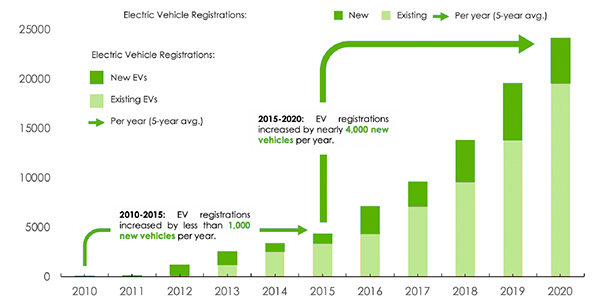2020 was an encouraging year for the electric vehicle industry in North Carolina, with EV sales growing by 5% while nationwide sales dropped 3% during the COVID-19 pandemic, according to a recent report from the Southern Alliance for Clean Energy (SACE) and Atlas Public Policy.
The report provides a deep dive into the stakeholders, policies and trends that it says could position North Carolina as a leader in EV adoption in the Southeast. But in a blog accompanying the study, Stan Cross, electric transportation policy director at SACE, said that the challenge before the state “is figuring out how to accelerate consumer and fleet EV adoption while ensuring all residents have equitable access to electric mobility.”
For example, the report notes that North Carolina does not currently offer any financial incentives or rebates for EV adoption. California, which leads the nation in EV sales, offers incentives to buyers of new as well as used EVs, to help stimulate the second sales market and improve accessibility.
The North Carolina Department of Transportation is considering establishing financial incentives for vehicles and charging infrastructure, according to the report, but legislation has yet to be introduced. Other high-impact recommendations in the report include creating EV-ready building codes and electrifying the state fleet, public transit and school buses.
Transportation electrification is a core element of Democratic Gov. Roy Cooper’s plan to reduce North Carolina’s greenhouse gas emissions 40% below 2005 levels by 2025, as laid out in a 2018 executive order. Transportation currently accounts for 42.5% of the state’s GHG emissions, according to the Energy Information Administration, and to put a dent in those figures, Cooper wants 80,000 zero-emission vehicles (ZEVs) on the road by 2025.
Cooper joined with governors from 14 other states and the District of Columbia last July to sign a memorandum of understanding committing the state to ensuring 100% of all medium- and heavy-duty truck sales be ZEVs by 2050. North Carolina is the only Southeast signatory.
While planning North Carolina’s programs for the MOU is still in the early stages, stakeholder consultations are at its core.
In a Feb. 22 presentation to the North Carolina Department of Environmental Quality (DEQ) Environmental Justice and Equity Advisory Board, Mike Abraczinskas, director of DEQ’s Division of Air Quality, emphasized that “a key element of this action plan is to focus on disadvantaged communities.”
“Strong stakeholder engagement in North Carolina’s efforts will be a central part of this program,” Abraczinskas said. “And we are starting that here today.”
Looking ahead, two key challenges to equitable transportation electrification face the state: funding and active utility engagement. Tapping into outside funding sources will be critical to ensure that underserved communities in heavily polluted areas can benefit from transportation electrification as soon as possible, the report says. In 2020, the first round of awards from the state’s share of the Volkswagen settlement were announced, including $6 million for electric school buses.
The state is slated to receive $92 million in the settlement Volkswagen is paying for its fraudulent emissions reporting. Another $64 million of North Carolina’s allocation remains to be awarded, and the report sees more of it going toward bus and other transportation electrification.
On the utility front, Duke Energy’s $76 million proposal to support transportation electrification was only partially approved by the North Carolina Utility Commission in November. The state’s largest investor-owned utility got the go-ahead for spending $25 million to install both DC fast and 220-V Level 2 chargers at public and multi-unit housing sites. The NCUC sent Duke back to the drawing board on other parts of its plan, requiring it to develop EV-charging rates to ensure community involvement in program design and to show clear net benefits for customers.
Critics of Duke’s plan said that equity was largely overlooked. For example, the NC Sustainable Energy Association argued at the November NCUC hearing that without a stronger focus on equity, the 30 electric buses in the plan ― to be distributed on a first come, first serve basis ― “would benefit wealthier counties and cities that would use up the rebates before poorer areas are able to participate.” NCSEA also questioned whether Duke’s plan to install Level 2 chargers in underserved communities is achievable.
The SACE report shows that at present, EV adoption is concentrated around North Carolina’s largest cities ― the Research Triangle of Raleigh, Durham and Chapel Hill, plus Charlotte and Ashville.
The report also highlights innovative programs being developed by the state’s municipal utilities and electric cooperatives, which could also provide models for the IOUs. North Carolina’s Electric Cooperatives, 26 cooperatives serving 2.5 million people, offers $3,500 rebates for qualified customers purchasing a Nissan Leaf. ElectriCities, a nonprofit organization of municipally owned electric utilities in the state, provides matching grants to help members develop community EV plans and present program options for their cities.
As North Carolina seeks to grow its EV market, the state can look to its neighbors for further policies and initiatives to implement, the report said. The Virginia Senate is currently reviewing House Bill 1979, which would create a rebate program for new and used EVs.
In 2018, Virginia also joined the Transportation and Climate Initiative, a collaborative effort by nine New England and mid-Atlantic states to reduce pollution and advance transportation electrification, as the only Southeast signatory. North Carolina recently started working with TCI, helping develop a new multi-state program investing $300 million per year in clean transportation. While neither North Carolina nor Virginia have officially signed on to this new program, they could do so in the future. Joining such regional initiatives could improve connectivity of EV infrastructure and programs up and down the East Coast, the report says.
By building on the MOU and Cooper’s 2018 executive order, and addressing the challenges of equity, funding and utility engagement, the report says the state has the potential to “spur investment in manufacturing, create clean jobs, and rapidly electrify both public and privately-owned vehicles.”





